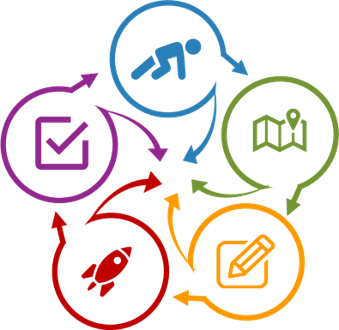During your stay at each institution, you will need certain information such as the term calendar, promotion and tenure policies, and course learning outcomes/objectives. In addition, you may want some help improving your course, moving your course to a new format (such as project-based learning), or implementing a new technology.
Unfortunately, it isn’t always easy to figure out what help is available or where to look. Most colleges and universities provide support applying educational theories, principles, and practices, as well as using technologies specifically to support student learning, but responsibility for support is often divided among several departments.
I suggest that you create a contacts list (perhaps starting with the form available here) to capture names, department titles, webpages, and contact information for your primary support areas.
The following table provides ideas of the types of help you might want and where to look. However, sometimes you may not know the proper language – such as the name of a specific technology – so the last column provides ideas on how you can search the website to get to a department/person that might be able to direct you further.
| Type of help | Department name(s) | Website search | |
| Designing a course | Support to help you apply educational psychology to design your course | CTL, CITL, CETL | Teaching and learning |
| Educational technologies | Technologies to use to support teaching & learning | IT, Online Learning | Teaching and learning, IT, LMS |
| Accessibility & inclusion | Support to help you meet the needs of special needs students | Accessibility, student services | |
| Course calendar | Provides start and end dates, holidays, drop dates, reading and exam dates, etc. | Registrar | |
| Selecting textbook and/or articles | Selecting materials, ordering deadlines, copyright info, costs, etc. | Library (start here), Print Shop | Library, Print Shop, Copy Center |
| Video production | Lecture capture in the classroom, office, or studio | IT, Online Learning | Teaching and learning, IT, LMS |
| Syllabus | Provides recommended (or required) format for syllabi, including wording for some topics | CTL, CITL, CETL, Faculty Senate | Teaching and learning, Faculty Senate, syllabus |
And here are some common terms new instructors may not know (more available here):
- Ed Techs – Educational Technologists: staff who support you (and sometimes students) by providing guidance on selection and use of technologies that are specifically used for teaching and learning. Ex.: LMS, video-capture, discussion groups and chat, mind mapping, and assessment tools.
- IDs – Instructional Designers: staff who have experience in sound educational practices in a higher education setting. Depending on their role, IDs may provide workshops and/or one-on-one support on educational practices, such as application of theories, active learning, effective use of educational technologies and educational psychology, or may be able to support you by designing and developing your online course following your guidelines.
- LMS – Learning Management System: online software used by instructors to provide students with learning materials such as the syllabus, readings, videos, assignments, etc. Use of an LMS may range from a completely online course to a course with just the syllabus available. Most LMSs include many other tools such as discussion forums, chats, links to publishers’ online textbooks, and grading. Ex.: Canvas, Blackboard Learn, Moodle or Desire-to-Learn/D2L.
- CTL (CETL, CIL…): Many universities have centers which support faculty in designing and delivering courses which use educational theories, principles, and practices to help students learn. The name of these centers varies, but you can find yours typically by searching for ‘teaching and learning’ on your university website, or by asking other instructors or your department admin.
Do you have additions/suggestions? Pleased contact us!
